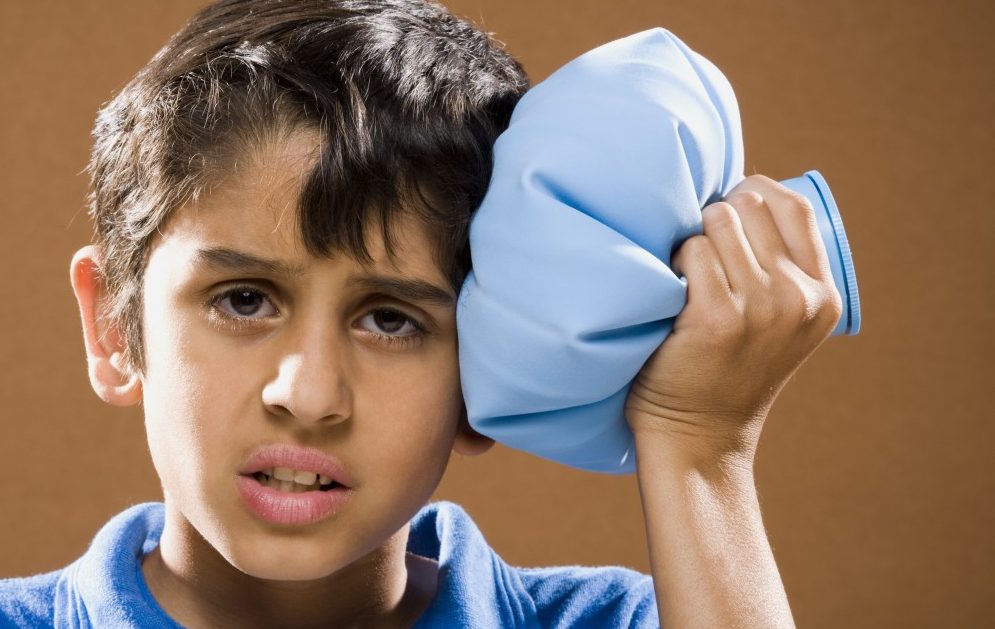Signs of a Concussion in Your Child

Head injuries in children can be dangerous if left undiagnosed, and many are underreported. Learn the signs of concussion and what to do about them.
According to the Centers for Disease Control and Prevention (CDC), the rates of childhood concussions are rising. About 2 million concussions occur in children per year.
More worrisome, though, is research that suggests concussions in children are underreported, and many childhood concussions may not be diagnosed at all.
The Journal of Pediatrics reports that approximately half of children admitted to emergency rooms for concussions were injured while playing sports. Children injured in non-sport activities, however, may be less likely to receive medical treatment, as the severity of their injuries often is unrecognized.
YOU MIGHT ALSO LIKE: Protect Your Child Against Concussion
What is a concussion?
A concussion is a brain injury caused by forceful trauma, usually to the head, face, or neck. They are usually considered a form of mild traumatic brain injury (mTBI) and account for about 75 percent of diagnosed brain injuries.
Like all brain injuries, concussions should are serious, as they can have dangerous short- and long-term effects when left untreated.
Dangers from childhood concussions
Though most concussions in children are mild, they should still be treated as serious injuries. Even a single brain injury, research has found, can affect your child’s physical and mental well-being if it is severe enough. Pediatric studies have found that an mTBI can interfere with school, affect social relationships, or cause changes in behavior.
Other studies conducted with adults have found that repeated concussions can lead to long-term brain damage, causing memory loss and poor motor control. The studies have also concluded the long-term effects of traumatic brain injury on children may be more severe than most people know, leading to cognitive and behavioral problems throughout adult life. In some cases, concussions can even be fatal.
Signs of a concussion
Children of any age can sustain a brain injury, including infants and toddlers. If your child has fallen or injured their head, changes in their behavior or mood will often signal an mTBI.
According to the CDC, in older children signs of a concussion are easier to recognize. They may include:
- Difficulty thinking clearly, remembering, or concentrating
- Sudden sleepiness or difficulty waking up
- Dizziness
A child with a concussion may complain of a headache or neck pain that does not go away, have blurry or fuzzy vision, feel nauseated, vomit, or have balance problems. They may also display sudden emotional changes, such as irritability, sadness, or anxiety.
YOU MIGHT ALSO LIKE: Micro Concussions Happen Often in Sports
In younger children, the Brain Injury Association of America warns that symptoms may be harder to diagnose, as children at young ages are less able to communicate. Toddlers may:
- Show unusual balance problems
- Vomit
- Be very sensitive to light
- Become unexpectedly sleepy
They may also cry or tell you something hurts but be confused about what exactly they are feeling.
Infants who have been dropped or bumped their head can also sustain a concussion. An infant with a traumatic brain injury will often cry inconsolably, have trouble focusing their eyes, refuse to eat or nurse normally, or be difficult to awaken.
No matter your child’s age, symptoms can show up right away, or they may appear within several hours or even a few days later. After a head injury, it is important to watch your child for signs of a traumatic brain injury for several days afterwards.
What to do if you think your child has a concussion
If your child receives a head injury, it is smart to see a doctor quickly, even if you worry that you might be overreacting. In some cases, a visit to an emergency room may even be necessary.
The CDC recommends that infants and toddlers be taken to the emergency room if they:
- Lose consciousness for more than 30 seconds
- Have a seizure
- Are difficult to wake up
- Have pupils of different sizes
- Vomit repeatedly
You should take older children to emergency care if they:
- Are difficult to awaken
- Have pupils of different sizes
- Slur when they speak
- Have convulsions
- Cannot remember facts like the date or where they are
- Lose consciousness
Even if your child does not show emergency signs, you should still seek medical help if they have a head injury. In such cases, however, a visit to your child’s pediatrician might be better than a trip to the emergency room.
According to Alex Diamond, DO, MPH, who specializes in pediatric sports medicine at Vanderbilt University Medical Center, your child’s pediatrician might be better able to diagnose a traumatic brain injury than an unfamiliar doctor in an emergency room.
“It’s great for a pediatrician to deal with this," Diamond told ABC News."They know the kid at baseline, and they know the family."
Updated:
March 31, 2023
Reviewed By:
Janet O’Dell, RN